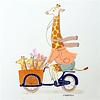Take a photo of a barcode or cover
Love, love, love this book. Justin Lee offers a story that many of us have heard many times - grew up Christian, devoutly resisted feelings of "same sex attraction"...and then had to rethink his entire understanding of God, the church, and sexuality when those desires refused to go away. A few things I especially appreciated about this book:
- His staunch denial of the efficacy of "ex-gay" programs and his clear-minded defense of why they don't work in the way that they sometimes advertise to
- His openness to many different understandings of Scripture with regards to gay people
- His emphasis on listening to and understanding one another, rather than fighting one another
- His deep compassion for all of the individuals whose stories he tells
This was a wonderful read and a very accessible introduction to how the Christian church can (and must!) do a better job relating to the LGBT+ community. I may end up buying copies for some friends who need to understand this issue better than I can explain it.
- His staunch denial of the efficacy of "ex-gay" programs and his clear-minded defense of why they don't work in the way that they sometimes advertise to
- His openness to many different understandings of Scripture with regards to gay people
- His emphasis on listening to and understanding one another, rather than fighting one another
- His deep compassion for all of the individuals whose stories he tells
This was a wonderful read and a very accessible introduction to how the Christian church can (and must!) do a better job relating to the LGBT+ community. I may end up buying copies for some friends who need to understand this issue better than I can explain it.
I've been meaning to read this book for years but kept getting distracted by other demands. But my dear friend Kylee sent me a link this week and insisted that it would fall weightier after reading the book. http://tonycampolo.org/for-the-record-tony-campolo-releases-a-new-statement/#.VXXfT5NVikp It's encouraging to see people who are thoughtfully wrestling with their theology and who are willing to change their minds in order to pursue what they now see as true. This book is a reminder that one of the greatest powers is in personal story-telling; you can disagree with someone's theology or worldview or choices, but you can't deny someone's story. Stories don't justify a theology or worldview, but they do force you to confront your own. Justin's vulnerability and bravery in sharing his story has already changed (and I believe will continue to change) the dialogue in a much needed way.
fast-paced
I really liked that the author did not shy away from examining scripture.
This book made me feel tired. As a lesbian Christian (Christian lesbian?) who has more or less not had to put up with the culture war to any great extent, and belongs to a queer-friendly denomination, it can be exhausting to hear over and over that I have to go talk to the people who hate me. It's not that Lee is wrong, I probably should reach out more, but my gut response to phrases like "Rescuing the Gospel from the Gays-vs.-Christians Debate" is, "We gays aren't the ones doing anything wrong!" That probably makes me privileged, entitled, and a bad Christian, but there you are.
I guess the problem is that this book isn't really for me. It's for Evangelical Christians, and that is not a perspective I understand that well (and I rather get the impression that my idea of faith is firmly what Lee would consider wishy-washy and not well thought out). I thought the book did a nice job of discussing the ethics and theology, and I love Lee's compassion for all sides, so I'm really glad that he's there, trying to build bridges and support people through their struggles, and I wish him and his organisation all the luck in the world, and all of God's Grace besides, but it seemed to all exist in a parallel universe from anything connected to my life. I say that as a lesbian and a Christian.
Granted, the book focuses on Lee's early understandings and interactions with the church and his own faith, and is meant to underline how much the culture war harms those caught in the middle, so it's not meant as a biography, but he never talked about what happened when he DID finally connect with the gay community. All he ever talks about in the book is how alienating he found it too, and how he later came to connect differently, but I never saw that bridge built, not in the way that the one to theology was. Lee is very careful to avoid condemning the gay community, and is sure to underline that he's not playing some sort of, "I'm not like the othergirls gays," game, which I appreciated, as I appreciated his nods to the trans community.
On the whole, it's probably a very good book, and my straight evangelical friend thinks it's amazing, but I'm clearly not the target audience. I found the prose a little simplistic, but appreciated the humour.
I guess the problem is that this book isn't really for me. It's for Evangelical Christians, and that is not a perspective I understand that well (and I rather get the impression that my idea of faith is firmly what Lee would consider wishy-washy and not well thought out). I thought the book did a nice job of discussing the ethics and theology, and I love Lee's compassion for all sides, so I'm really glad that he's there, trying to build bridges and support people through their struggles, and I wish him and his organisation all the luck in the world, and all of God's Grace besides, but it seemed to all exist in a parallel universe from anything connected to my life. I say that as a lesbian and a Christian.
Granted, the book focuses on Lee's early understandings and interactions with the church and his own faith, and is meant to underline how much the culture war harms those caught in the middle, so it's not meant as a biography, but he never talked about what happened when he DID finally connect with the gay community. All he ever talks about in the book is how alienating he found it too, and how he later came to connect differently, but I never saw that bridge built, not in the way that the one to theology was. Lee is very careful to avoid condemning the gay community, and is sure to underline that he's not playing some sort of, "I'm not like the other
On the whole, it's probably a very good book, and my straight evangelical friend thinks it's amazing, but I'm clearly not the target audience. I found the prose a little simplistic, but appreciated the humour.
Insightful, compassionate, and thorough exploration of the complexities of sexuality and the church through Justin's own story. This is an excellent resource for any LGTBQ+ Christians, their friends and families, and any straight Christians also seeking insight regarding this issue. I vastly appreciated and valued Lee's emphasis on our ultimate calling to love and treat one another with grace, mercy, and respect. I found his message to be incredibly helpful and courageous.
This is an essential read. The author, himself a gay Christian, shares his personal journey and looks at both sides of the ‘gays vs Christians’ debate in a very honest and straightforward way. Although his conclusions may not be agreeable for everyone, they are still worth considering. Overall, he asks for more love and understanding from both sides. No matter where you sit in regards to this topic, I highly recommend this one to you.




